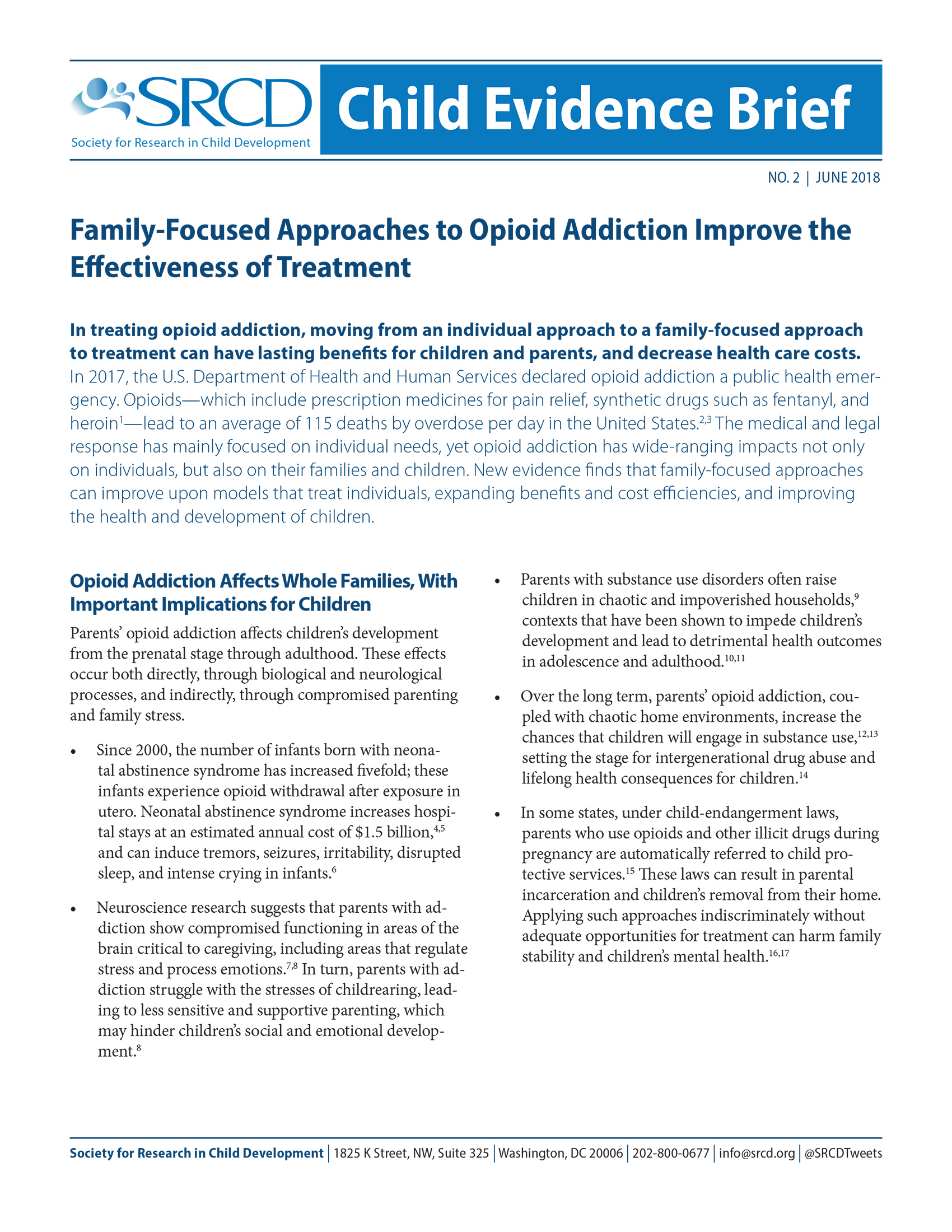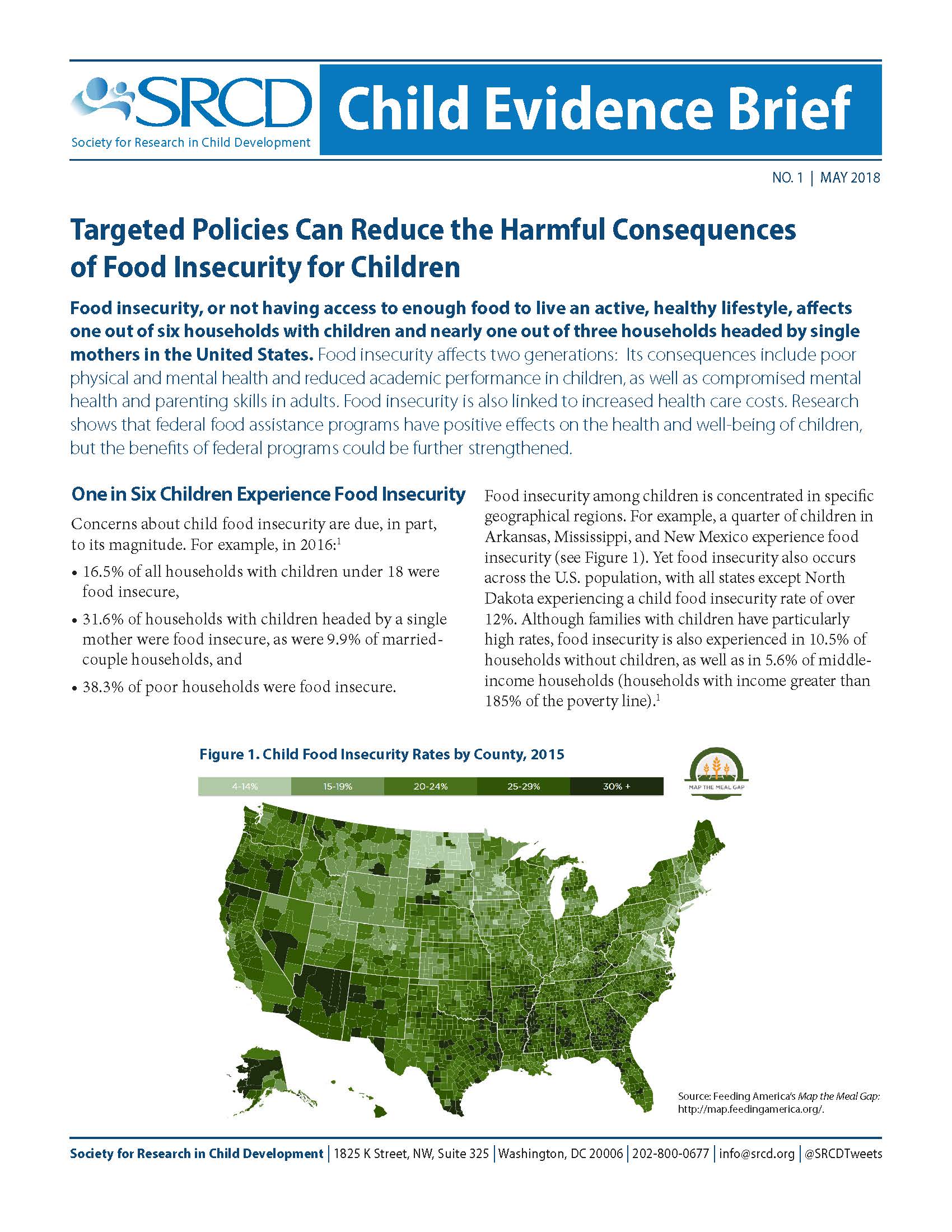SRCD is pleased to announce the Child Evidence Briefs Pilot Project.The project, approved by Governing Council in the Fall of 2017 and launched in early 2018, is designed to bring cutting-edge scientific information to inform child relevant policy decisions, specifically those anticipated to be a focus in legislative discussions in the U.S. Congress. A policy scan conducted every several months will help to anticipate issues that will be a focus of Congressional policy discussions. Candidate issues that are suitable topics for Child Evidence Briefs are then identified by the Editor in consultation with the Editorial Team and Advisory Board (listed below).
Briefs are authored by content-area experts and are peer reviewed. They are edited for clarity of communication to non-technical audiences. The Child Evidence Briefs are disseminated to each congressional office working on an issue, as well as to advocacy groups and other key stakeholders, with invitations to arrange follow-up in-person meetings. Over time and depending on the success of the pilot, SRCD may expand to summaries of the evidence on issues of high priority in state legislatures. The first two Child Evidence Briefs, prepared and disseminated in spring of 2018, appear below.
In addition to bringing clear and succinct summaries of the scientific evidence to U.S. Congress regarding specific domains of importance to child and family policy, a key goal is to increase the extent to which SRCD is viewed as a resource to policymakers on research related to children and families more globally.
First Two Briefs in the Pilot of the Child Evidence Brief Series
Family-Focused Approaches to Opioid Addiction Improve the Effectiveness of Treatment
 Helena J.V. Rutherford, Ph.D., Yale School of Medicine
Helena J.V. Rutherford, Ph.D., Yale School of Medicine
Declan T. Barry, Ph.D., Yale School of Medicine
Linda C. Mayes, M.D., Yale School of Medicine
In treating opioid addiction, moving from an individual approach to a family-focused approach to treatment can have lasting benefits for children and parents, and decrease health care costs. In 2017, the U.S. Department of Health and Human Services declared opioid addiction a public health emergency. Opioids—which include prescription medicines for pain relief, synthetic drugs such as fentanyl, and heroin—lead to an average of 115 deaths by overdose per day in the United States. Read more on the SRCD website or download a PDF.
Targeted Policies Can Reduce the Harmful Consequences of Food Insecurity for Children
 Barbara H. Fiese, Ph.D., University of Illinois at Urbana Champaign
Barbara H. Fiese, Ph.D., University of Illinois at Urbana Champaign
Craig Gundersen, Ph.D., University of Illinois at Urbana Champaign
Food insecurity, or not having access to enough food to live an active, healthy lifestyle, affects one out of six households with children and nearly one out of three households headed by single mothers in the United States. Food insecurity affects two generations: Its consequences include poor physical and mental health and reduced academic performance in children, as well as compromised mental health and parenting skills in adults. Read more on the SRCD website or download a PDF.
Child Evidence Brief Editorial Team
- Rebekah Levine Coley, Ph.D., Boston College, Editor
- Martha Zaslow, Ph.D., Director for Policy, SRCD
- Ruth Friedman, Ph.D., Senior Policy Strategist
- Anne Bridgman, Science Writer
Child Evidence Brief Advisory Board
- Bruce Lesley, First Focus
- Deborah Phillips, Ph.D., Georgetown University
- Ruby Takanishi, Ph.D., New America
- Kenneth Dodge, Ph.D., Duke University, Governing Council Representative
- Rashmita Mistry, Ph.D., University of California, Los Angeles, Governing Council Liaison
- Pamela Cole, Ph.D., Pennsylvania State University, SRCD Publications Committee Liaison